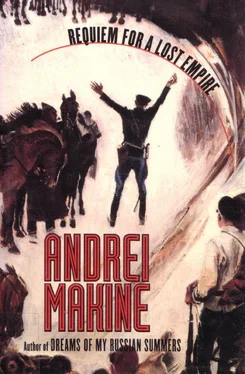"Behold, the new masters of the country!" I ventured at last, looking back toward the crowd of them as they returned to the restaurant. You said nothing. We were walking along an avenue beneath the walls of the citadel, beneath the towers surmounted by their mistily crystalline red stars. Faced with your silence, I wanted to provoke you, to compel you to reply, to drag you from your calm. "The masters change but the servants remain. How many years have we spent snuffling around like dogs in all those stinking little wars? And all for the greater glory of a dozen senile idiots barricaded in behind that wall! And now you're ready to do the same job all over again for that bunch of money-grubbers and their bimbos bursting out of their designer dresses!" I stopped, turned toward you, awaiting your response. But you went on walking, your gaze somewhat lowered toward the footprints ahead of us, which the snow was patiently obliterating. Soon there were a dozen paces between us, then a score, so that you looked to me as if you were all alone amid the trees with their snow-covered branches, very remote, and quite detached from the life I had been mocking. A moment before, stung by your absent air, I was on the point of turning my back and leaving you. Now that at every step you were becoming more and more of a stranger to me, I felt you within me with a violence that made my eyes swim. You were going away and I could feel the warmth of your breath in the night air, the coolness of your fingers inside your gloves, the beating of your heart beneath your coat. You turned. You were already so far away that I could no longer make out whether you were smiling or looking at me with sadness. I went toward you with a sense of finding you again after a protracted separation, at the end of an infinitely long walk.
By an absurd coincidence the merrymakers from the Moscow banquet caught up with us again in a restaurant in Paris. They were not the same people, of course, but their wealth came from the same source, they were pulling the same faces. We were looking for a quiet corner and this half-empty dining room was it. Thirty minutes later they made their appearance and settled at a long table that had been reserved. Trapped, we stayed to listen to them. There was no longer any need for me to talk to you about the "new masters," or about the years we had used up for nothing, or about the end. You understood what my thoughts might be, watching them giving vent to coarse guffaws with their mouths full, their monolithic backs, their fingers studded with rings. I could imagine what your answers might be. Later, in a little café where we went to escape them, you spoke quite calmly about the age we had seen come into being, which was now about to end.
"Ten years ago, or maybe more, I used to think just like you: all these wars to paper over the cracks of a shattered doctrine? All these efforts to please the doddering old fools in the Kremlin? One day, unable to bear it any longer, I said this to Shakh. Like you. For the glory of what cause? Toward what sunlit chasms? He listened to me and… began speaking about Sorge. I was simply furious. I said to myself, 'That's it, he's going to give me a propaganda lesson: "Richard Sorge, the hero of our time, the superman of our intelligence system, who passed on the date of Hitler's invasion, was betrayed by the bureaucrats of Moscow…" et cetera, et cetera. Ancient history.' But Shakh simply told me about Sorge's last moments. I only knew, like everyone else, that the Japanese had executed him in forty-four after three years of imprisonment. That's all. Well, at that final moment, standing on the scaffold, Sorge called out in a strong, calm voice, 'Long live the Red Army! Long live the Communist International! Long live the Communist Party of the Soviet Union!' Old-fashioned, isn't it? Grotesque? I said as much to Shakh, in milder terms, it's true. And he surprised me yet again. 'Do you think,' he said, 'Sorge didn't know the true worth of Stalin and his clique? He certainly did, and how! But it was by dying like that that he could show what those sons of bitches were really worth!' "
I sensed that this man on the scaffold was your final argument. I did not attempt to put in context his words as a condemned man. A minute before death they had a right to stand unqualified. I was watching you as you talked and sadly noticing all the signs that your smile could no longer cover up: the strands of silver spreading through your hair, the fine blue line of a vein imprinted on your temple. You interrupted my look, which was no doubt too searching, by taking a newspaper out of your bag. "Read that," you said.
It was a short column reporting the death of a certain Grinberg, a critic of the Soviet government who had spent several years in the camps, had been expelled to the West, and had run a dissident radio station. The reporter noted that Grinberg had died in Munich in a tiny flat, forgotten by everybody, with a jumble of papers on his bedside table: his writings that no longer interested anyone, bills that he was unable to pay, letters.
"Can you guess who they're talking about?"
For a few seconds I delved into my memories both in Russia and the West. Grinberg… No, the name meant nothing to me.
"The man who spun that top in the art gallery in Berlin, do you remember? Almost… ten years ago. You see, he's lost his battle as well."
We sat for a moment without speaking. Then you got up, leaving the newspaper on the next table, and murmured, "I'm not going to play the gypsy and tell your fortune, but if you don t want to serve 'the new masters' it's time for you to go. Yes, go, withdraw from the game, get yourself forgotten, disappear. After all, it'll only be one more change of identity."
That night you tried to hold back your tears, so as not to wake me. I was not asleep but remained still, knowing that in your thoughts, and in these tears, I was already living under that new identity, in that distant life without you.
I had used up too many lives to consider the one I was embarking on without you in the West as a real wrench from the past. The Western World was, in truth, too familiar to us to deserve the harsh and weighty name of exile. You were right; to begin with, at least, it was no more than another identity. And I already knew that the best way to adopt a country, to adapt to it as quickly as possible, was to imitate. Basically, integration means no more than imitation. Some people are so successful at this that they end up expressing the character of a country better than its natives, very much in the manner of those professional impersonators who can take such and such a well-known personality and set alongside him a copy that is more authentic than the original, a distillation of all his physical mannerisms, a digest of all his tricks of speech. And yet it is at the moment when he has succeeded that a foreigner discovers the unspoken goal of this game of imitation: to make oneself similar in order to stay different. To live as they live here as a way of protecting your remote and distant self. To imitate to the point of splitting yourself in two and, by letting your double speak, gesticulate, and laugh for you, to escape back in your thoughts to those whom you should never have abandoned.
At first my conviction that I should see you again within a short space of time was only natural. By imitating daily life and material survival I was earning the right to this expectation, to journeys to European cities where meeting you seemed likely. I told myself it would not even be a case of rediscovering one another but quite simply of your quiet voice one evening on the telephone, or your figure emerging from the flood of faces and coats on a railroad platform. I cannot recall how many months it was before this confidence began to fade. At the same moment, perhaps, when I realized I had never stopped talking to you, rehearsing with you over and over, the years I had spent with you, justifying myself, in fact, in a desperate attempt at truth.
Читать дальше










